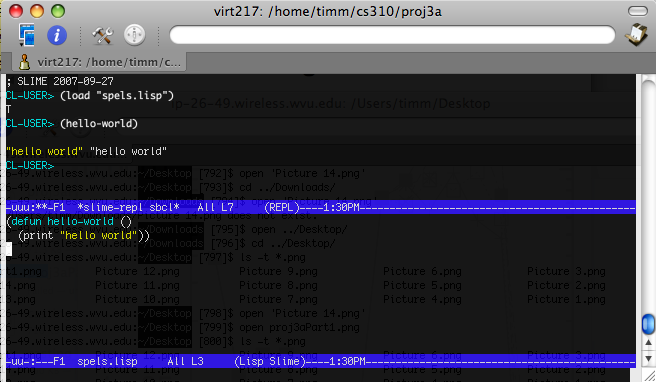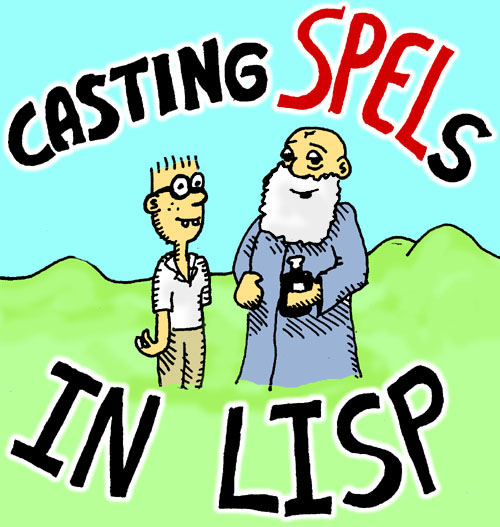

Download and read the following:
For full marks in this project, print out and give me a hard copy of
For 2.5 bonus marks, give me a hard copy of
Note: to create the transcripts, run the whole thing in EMACS (using the instructions below), then save the interaction buffer (using Control-X-S).
Run the following commands:
mkdir -p ~/opt/tmp/backup mkdir -p ~/opt/iccle/etc/color-theme/color-theme-6.6.0 mkdir -p ~/cs310/proj3a cd $HOME cp ~timm/.emacs $HOME cd ~/opt/iccle/etc/color-theme/color-theme-6.6.0 cp -r ~timm/opt/iccle/etc/color-theme/color-theme-6.6.0/* .
Now, does your emacs installation work? To check that, run the following nine tests. Note, if the following, if you see:
% cd ~/cs310/proj3a % emacs Control-X 2
Can you grab the horizontal barrier and pull it up and down?
Control-X 3
Can you graph the vertical barrier and pull it right and left
If you click on each of the buffers, does the cursor move around?
C-x C-f spels.lisp
Can you enter this text
(defun hello-world () (print "hello world"))
C-x C-s filenameC-x C-c
You should be back in UNIX. Try:
cat spels.lisp
Can you see the file you created?
% emacs spels.lisp
Can you see your file?
M-x slime
After a little wait, you should be looking at
; SLIME 2007-09-27 CL-USER>
Now type
(+ 1 2)
What is 1 + 2?
CL-USER> (load "spels.lisp") (hello-world)
You should see "hello world"
At the Unix command line,
% emacs spels.lisp
Then, in emacs
C-x 2 M-x slime (load "spels.lisp") (hello-world)
Your screen should look like the following (with you path name in the window title).

Take a screen snap, print it, write your group's name at the top, hand that in.
Recreate the environment of test9. Read the "Casting Spels" book, type in the code into "spels.lisp", and recreate all the output shown in brown text; e.g., on page 10:
(describe-location 'living-room *map*)
==> (YOU ARE IN THE LIVING-ROOM OF A WIZARD'S HOUSE.
THERE IS A WIZARD SNORING LOUDLY ON THE COUCH.)
Remember that, to run your code you have to:
Do not use the on-line Franz Lisp. Instead, use CSEE machines.
Ignore the code
(setf tpl:*print-length* nil)
After you complete Pages 1..10, add this code to the top of spels.lisp. If defines an "(init)" function which resets the game back to some initial state (which is useful for starting all over again, from scratch).
(defparameter *objects* '(whiskey-bottle bucket frog chain))
(defparameter *map* '((living-room (you are in the living-room of a wizard's house.
there is a wizard snoring loudly on the couch.)
(west door garden)
(upstairs stairway attic))
(garden (you are in a beautiful garden. there is a well in front of you.)
(east door living-room))
(attic (you are in the attic of the abandoned house.
there is a giant welding torch in the corner.)
(downstairs stairway living-room))))
(defparameter *location* nil)
(defparameter *object-locations* nil)
(defun init ()
(setf *object-locations* '((whiskey-bottle living-room)
(bucket living-room)
(chain garden)
(frog garden)))
(setf *location* 'living-room))
(init)
Get up to the point where you can pickup a whiskey bottle.
Note, you can stop right here and get full marks form Project 3a.
For 2.5 bonus marks, complete the rest of the tutorial.